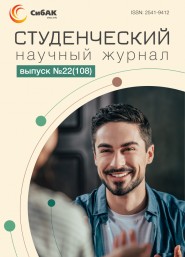Статья опубликована в рамках: Научного журнала «Студенческий» № 22(108)
Рубрика журнала: Педагогика
Скачать книгу(-и): скачать журнал часть 1, скачать журнал часть 2, скачать журнал часть 3
USE OF DIGITAL EDUCATIONAL RESOURCES IN THE EDUCATIONAL PROCESS IN THE CONTEXT OF INFORMATIZATION OF SOCIETY
ИСПОЛЬЗОВАНИЕ ЦИФРОВЫХ ОБРАЗОВАТЕЛЬНЫХ РЕСУРСОВ В УЧЕБНОМ ПРОЦЕССЕ В УСЛОВИЯХ ИНФОРМАТИЗАЦИИ ОБЩЕСТВА
Рахимова Жания Нурлановна
магистрант, педагогический факультет иностранных языков, КазУМОиМЯ имени Абылай хана,
Казахстан, г. Алматы
ABSTRACT
This article examines the issues of informatization of professional education, the possibility of using digital educational resources to improve the quality of training.
АННОТАЦИЯ
Данная статья рассматривает вопросы информатизации профессионального образования, возможности использование цифровых образовательных ресурсов для повышения качества обучения.
Keywords: digital educational resources (DES), informatization, digital technologies, foreign language education.
Ключевые слова: цифровые образовательные ресурсы (ЦОР), информатизация, цифровые технологии, иноязычное образование.
The present time can be called with confidence as the time of development of a new system of education, which is based on active independent educational activities of students in the context of informatization of the educational process. The paradigm of education has changed, the learning process has become interactive, students have become not only consumers of knowledge from the teacher, but also began to acquire knowledge themselves, activating the process of self-education.
The use of modern information and technical means of training contributes to the awareness of the idea of "learning throughout life", the development of skills of independent educational and cognitive activity and self-education, the desire to use knowledge, skills and abilities [1, p. 64].
Today, we can interpret informatization of the educational process as a process of active receipt and processing of information for the purpose of its further practical application, that is, it is not "training for the sake of obtaining knowledge", but "training for obtaining knowledge and their further application in real life" [2, p.9].
One of the possible ways to improve the quality of education is to organize the learning process based on the use of digital educational resources (DES). This is due to the fact that the widespread introduction of digital educational resources is aimed at implementing the ideas of developing learning, improving the forms and methods of organizing the educational process, ensuring the transition from mechanical assimilation of factual knowledge to mastering the ability to independently acquire new knowledge [3, p.23].
First, let's define what we mean by the term "DES". DES is an educational resource that is a complete interactive multimedia product aimed at achieving a didactic goal or solving certain educational tasks [4, p.23].
The introduction of digital educational resources (DES) in the learning process is considered as one of the most fundamental strategic problems of the development of civilization. Informatization of education, the introduction of electronic tools in the process of learning and management, despite its novelty, has become quite widespread throughout the world. Numerous courses and universities have started to appear that allow students to study remotely using e-learning content.
In contrast to conventional methods, where the teacher is used to provide and demand certain knowledge, when using interactive forms of learning, the student himself becomes the main acting figure and opens the way to the acquisition of knowledge. The teacher acts as an intensive assistant in this situation, and his main function is to organize and stimulate the educational process.
The use of digital educational resources in English lessons allows [5, p. 102]:
- improve the effectiveness of the lesson and the quality of knowledge;
- focus on modern learning goals;
- increase students ' motivation to learn English;
- take into account the country-specific aspect;
- make the lessons memorable and emotional;
- implement an individual approach to training
Thus, the use of DES in the educational process to improve the quality of foreign language education has proven to be effective, since DES contributes to the motivation of students, better assimilation of educational material, provides an opportunity to consolidate the knowledge and control the assimilation of knowledge.
References:
- Sokolova M. G. Organizational and pedagogical conditions for training teachers of higher education to implement modern information technologies of training: dis. ... candidate of pedagogical Sciences: 13.00.01. - Astana, 2004. - 141 p.
- Sysoev P. V. Direction of Informatization of linguistic education at the modern stage / / Language and culture. - 2015. - №. 1. - Pp. 156-168.
- Information technologies in the activity of a subject teacher. Part I. Manual for the system of additional professional education. Moscow: Russian political encyclopedia (ROSSPEN), 2007. - 172 p.
- Dzhusubalieva D. M., Dzhonisova G. B. the Use of digital educational resources in the independent work of students of a language University // Proceedings of Kazakh Abylai Khan university. Series "Pedagogical Sciences". – 2015. - № 1 (36). – Pp. 21-27.
- Solomakhina I. A., Malyukova G. N. Use of multimedia tools in teaching a foreign language. - Moscow: publishing house First of September 2005. - 264 p.


Оставить комментарий